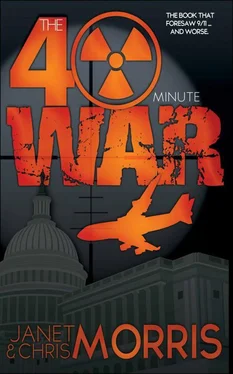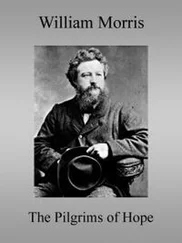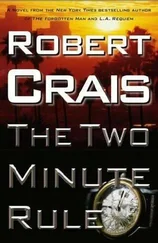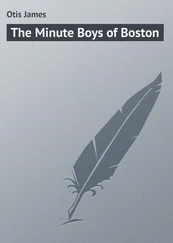“Come on , you two,” Slick whispered urgently, “you’re going to blow this whole thing,” as he sidled past them to block any passing diplomat’s view.
Reluctantly, Beck pushed her away. His eyes were bloodshot and his mouth a thin white line: “How are you?”
“Fine.” She straightened her shoulders. “Just fine. Did you know that Ashmead’s sister is married to a Saudi prince? That Faisal, out there, says that whatever help he wants from their ministers, all he —that doesn’t mean the rest of us, or the Administration, or anyone else—has to do is ask?”
Slick spoke before Beck could answer: “There’s a slew of Saudi princes, lady. And Ashmead would never do that.”
Beck ignored Slick: “We’ll be landing in forty-five minutes. There’s a Presidential briefing scheduled for 0600; we’ve a rest period before that. If you’re not too tired, Slick will bring you to—”
“It’s all taken care of, Beck. Get out of here, back up to the flight deck where you belong.” Slick’s voice was soft but terse.
Wordlessly, on the verge of tears again, Chris turned away and pulled the glass coffee pot from its housing, thrusting a styrofoam cup under the fresh stream that had been dripping into the pot.
“Check,” Beck said evenly. “Just as soon as I get my coffee.”
Chris handed the cup to him, oblivious of the scalding liquid that dripped onto her hand as she pulled the cup back and replaced it with the pot. “See you later, then,” she said hopefully, and realized as she did that the possibility of a Presidential briefing with herself as the only reporter in attendance was nothing compared to the possibility of even twenty minutes with him alone.
When he’d gone, she told Slick she had to fix her face and spent half the time remaining before she was to meet Beggs, the new President of the United States, face to face, crying her heart out in the cramped rest room of the P-3B.
Ashmead’s aircraft was in a blind spot, as far as ground control and radar contact, and he didn’t want to think about why. Fort Bragg Control had told him not to worry about it—the P-3B would be picked up by Lackland Air Force Base and then handed over to Houston.
There was just this little, lonely space to get through, a solitary overflight of Alabama and Mississippi. After that, the P-3B would have an F-15 escort the rest of the way to Dugout, the Houston White House—as they’d had a Special Forces honor guard from Bragg until the squadron leader had peeled off with a cheerful, “Have a nice day, fellas: we burn fuel about as fast as our tankers can pump it, so this is as far as we go,” and headed back to base, leaving Ashmead with the feeling that he was flying this mission over the Sahara or Central Africa, listening to virgin static in his phones.
It was downright disconcerting to find dead air even on the prerecorded flight information channels when all the pre-war flight charts they had aboard told them that they were in busy air corridors dotted with Prohibited and Restricted sectors over which a dozen civilian and military controllers ought to be keeping caerful and possessive watch.
Thoreau kept punching in new frequencies from those suggested on his area sectional, trying to raise some tower chatter or even ATIS weather advisories; but otherwise, the ex-SEAL pilot was holding up better than Ashmead had any right to expect, considering that Yael had been carrying his child and it was Ashmead’s decision—not Beck’s—that had put her on the doomed 727 when he ought to have known better and that they had only forty-five minutes’ worth of fuel to spare; not much room for error in the projected landing at the secret facility west of Houston.
“Go get some coffee, Thoreau. Stretch your legs. Hit the head. And bring me a cup, black, when you come back,” Ashmead said easily.
“Great, thanks,” Thoreau said without enthusiasm, slipping off his headset and slipping out of his crash harness to stand, slumped so he wouldn’t bump his head, hand to the small of his back. Then he touched Ashmead’s arm. “Rafic… I… It’s nobody’s fault.”
“Hold that thought, Thoreau, and we’ll get through this just fine.”
“Yes, sir. Want Slick up here while I’m gone?”
“Beck, actually.” Ashmead craned his neck to watch his pilot.
Thoreau grimaced: “Just don’t let him touch anything while you’re debriefing him. One degree off heading and we’re looking at a dead-stick landing, which I could do without, considering they expect me to put this baby right in the decontamination washbay. On second thought…” Thoreau leaned forward, punched buttons, and stood up again, “leave it on autopilot while he’s up here. You know where the revert-to-manual is, if you need it.”
“Unfortunately, I’m not going to need it,” Ashmead said gently. It was time to talk about what they were both feeling: “Real eerie, up here, like having the East River Drive all to yourself.”
“Yes Sir, well… jet fuel’s got to be at a real premium. Back in five,” Thoreau promised with a desultory salute.
Alone, Ashmead leaned back, staring at the control-studded panels above the windshield, then closed his eyes and rubbed them with the palms of his hands. The worst part of this mission was that no one had any privacy in which to react to the various tragedies as they occurred—twenty-one hours of flight time, plus the Moroccan stopover the slow P-3B had needed because its mission-capability limit was only fourteen hours, was altogether too long sitting around on low-level alert status to do any of his team much good.
What was left of his team, he amended gloomily, and told himself that Thoreau’s and Slick’s morale was holding up better than his own: he kept trying to find a way to justify the sacrifice of Zaki, Yael, and Jesse to Beck’s cockamamie mission, and he couldn’t; the only way to do that was to win unequivocally, and all the data he was collecting told him that wasn’t possible. There was too much wrong and not enough chance that they could restore the status quo ante. It would take a miracle to do that, and he wasn’t a miracle worker.
In spite of twenty-two years of government service and a top-secret verbal report from an analyst named Watkins whom Ashmead knew to be close to infallible, the lack of seaboard lights and air traffic had shocked Ashmead to the core. He’d known it was bad, but he was an optimist in his way, as a field commander must be, and he was also human: damage estimates were just words and concepts; his mind kept minimizing their significance until he saw the dark swath in the Northeast Corridor with his own eyes.
When Beck came in and slipped into the pilot’s seat, Ashmead couldn’t help thinking that, if not for Beck, he and his team would be somewhere in the Persian Gulf, happily greasing terrorists where, if they took casualties, those casualties would have been acceptable, taken in a venue and for a reason all of them could easily understand.
Beck said: “I’ve been listening to Chris’s tapes. She got some good stuff from Dugard on NATO’s extant war-fighting capability; he and that Nacht from IMF got into an informative little wrangle about relative throw-weights in NATO and the Warsaw Pact and the possibility that NATO might yet launch if it feels their—or our —remaining interests are threatened.”
“Shit, Beck, what are you telling me? That those fools haven’t had enough boom-boom to suit them?”
“That there’s still violent polarity, and where there’s polarity, there’s room for diplomacy and, in this case, a chance of freezing the balance of power… national identities, integrities—borders, if you will.”
Читать дальше












